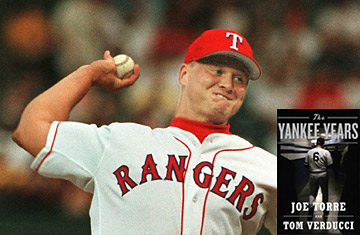
Texas Rangers pitcher Rick Helling in 1998
(3 of 3)
Well, there you had it. No wonder nobody wanted to listen to Helling. The owners and players didn't even want to acknowledge that something harmful was going on. A presentation on the benefits of testosterone? Not worse than cigarettes? Helling, though, didn't give up. Each year he would make the same speech at the players association board meeting ... 1998, 1999, 2000, 2001 ... and each year nothing would happen, except that more and more bodies grew unnaturally bigger and the game became twisted into a perversion, its nuances and subtleties blasted away by the naked obsession with power. Baseball was reduced to the lowest common denominator: to whack the ball farther or to heave it faster. Baseball's inability and unwillingness to act made silent partners of Selig and his traditional rivals at the union, leaders Don Fehr and Orza. Neither side had the smarts or the stomach to make steroids a front-burner public issue.
"Steve [Fehr] and Don came to me and said, 'Rick Helling is talking up steroids. Do you think there's a problem here?' " Cone said, referring to the Fehr brothers, including Steve, Cone's agent. "I said, 'Maybe we need to talk to guys, but I don't really see a problem.'"
The union, Helling said, did talk to some players about it, but the pitcher was wise enough not to expect anything to come of it.
"I understood their side of it, from a lawyer's side," Helling said. "Their thinking was, 'This isn't anything ownership has asked us for. It's never been an issue [in bargaining]. So why would we give them something without getting something in return. Why open this box?'
"I was active in the union. I know Don and Gene very well. Still to this day I talk to them. I understand. 'We don't want to go down that road if we don't have to.' Every year I brought it up. I'd say, 'This is more of a problem than you think.' Bud, Gene, Don ... they had an idea of what was going on. They didn't realize how widespread it was. As players, we kind of did know. Whether it was 50% or whatever, I can't say. It was more than people thought. It was more than Don, Gene and Bud thought. So the thinking was more, 'If ownership didn't ask for it, why volunteer it? It's probably not that big a deal.' "
Helling said he never saw a player inject steroids, but he heard all the clubhouse talk about what players were doing, as they would euphemistically put it, to "get an edge." Helling himself had a very clear understanding of what was cheating and what was not. He was born in Devils Lake, North Dakota, and became one of only 15 men born in that state to become a big leaguer. He attended Stanford University and made his major league debut with Texas only two years after the Rangers selected him with a second round pick in the 1992 draft. He pitched decently for both the Rangers and Marlins (he was once traded to Florida and back within 11 months) before committing himself to a strenuous conditioning and fitness program after the 1997 season. In 1998, his first full year as a starting pitcher, he won 20 games. He would pitch 12 seasons in the majors, compiling a record of 93-81 while earning more than $15 million.
"I can look back on my career, and whether it was good or bad, I know that everything I did, I did myself," Helling said. "I didn't do any form of cheating. It's unfortunate that there were a lot of people I knew who thought, 'I need to do something to keep up.' You hear the excuses of the guys who admitted it: 'I felt like I had to do it.' The way I looked at it, when I wasn't good enough to do it myself, it was time to move on. A lot of players didn't think like that. Guys always had an excuse of why they could do it.
"That's not what I was about. I can look back and know it was all me. That's the most important thing. I have my name and my reputation. Anybody who knows me knows there was no doubt that I played it the right way. And that's what I wanted to leave the game with. I couldn't care less if I made one million dollars or one hundred million dollars, whether I won one game or whether I won three hundred games. I was in it to be honest to myself and my teammates and to be a good father and husband. For me it was just the way I was brought up."
Rick Helling, by playing clean, was swimming against the tide.
Excerpted from The Yankee Years by Joe Torre and Tom Verducci. Copyright 2009 by Anjoli Inc. and Tom Verducci. Reprinted with permission by Doubleday, a division of Random House Inc. All rights reserved.
